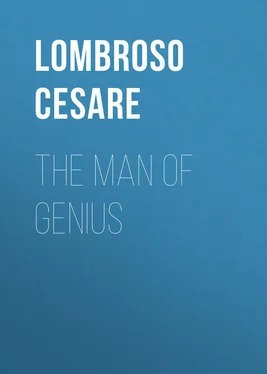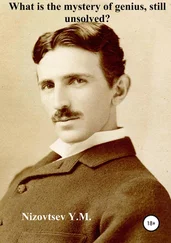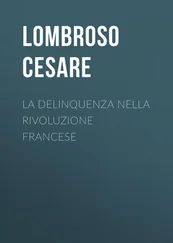Cesare Lombroso - The Man of Genius
Здесь есть возможность читать онлайн «Cesare Lombroso - The Man of Genius» — ознакомительный отрывок электронной книги совершенно бесплатно, а после прочтения отрывка купить полную версию. В некоторых случаях можно слушать аудио, скачать через торрент в формате fb2 и присутствует краткое содержание. Жанр: foreign_antique, foreign_prose, на английском языке. Описание произведения, (предисловие) а так же отзывы посетителей доступны на портале библиотеки ЛибКат.
- Название:The Man of Genius
- Автор:
- Жанр:
- Год:неизвестен
- ISBN:нет данных
- Рейтинг книги:5 / 5. Голосов: 1
-
Избранное:Добавить в избранное
- Отзывы:
-
Ваша оценка:
- 100
- 1
- 2
- 3
- 4
- 5
The Man of Genius: краткое содержание, описание и аннотация
Предлагаем к чтению аннотацию, описание, краткое содержание или предисловие (зависит от того, что написал сам автор книги «The Man of Genius»). Если вы не нашли необходимую информацию о книге — напишите в комментариях, мы постараемся отыскать её.
The Man of Genius — читать онлайн ознакомительный отрывок
Ниже представлен текст книги, разбитый по страницам. Система сохранения места последней прочитанной страницы, позволяет с удобством читать онлайн бесплатно книгу «The Man of Genius», без необходимости каждый раз заново искать на чём Вы остановились. Поставьте закладку, и сможете в любой момент перейти на страницу, на которой закончили чтение.
Интервал:
Закладка:
Cesare Lombroso
The Man of Genius
PREFACE
IT has never before happened that in the latest edition of a book I have had to disown so much in preceding editions; my first imperfect and spontaneous idea has never before been so modified and transformed, the final form being, perhaps, not even yet altogether attained.
The idea that genius was a special morbid condition had indeed often occurred to me, but I had always repelled it; and besides, without a sure experimental basis, ideas to-day do not count. Like still-born children, they appear but for a moment, to disappear at once. I had been enabled to discover in genius various characters of degeneration which are the foundation and the sign of nearly all forms of congenital mental abnormality, but the exaggerated extension which was at that time given to theories of degeneration, and still more the vague and inexact character of that conception, had repelled me; so that I accepted the facts, but not their ultimate consequences. How, in fact, can one suppress a feeling of horror at the thought of associating with idiots and criminals those individuals who represent the highest manifestations of the human spirit?
But recent teratologic researches, especially those of Gegenbauer, have shown that the phenomena of atavistic retrogression do not always indicate true degradation, but that very often they are simply a compensation for considerable development and progress accomplished in other directions. Reptiles have more ribs than we have; quadrupeds and apes possess more muscles than we do, and an entire organ, the tail, which we lack. It has been in losing these advantages that we have gained our intellectual superiority. When this is seen, the repugnance to the theory of genius as degeneration at once disappears. Just as giants pay a heavy ransom for their stature in sterility and relative muscular and mental weakness, so the giants of thought expiate their intellectual force in degeneration and psychoses. It is thus that the signs of degeneration are found more frequently in men of genius than even in the insane.
And again, this theory has entered to-day on so certain a path, and agrees so entirely with my studies on genius, that it is impossible for me not to accept it, and not to see in it an indirect confirmation of my own ideas. I find this confirmation in the characters of degeneration recently discovered; 1 1 Magnan, Annales Médico-Psychologiques , 1887; Lombroso, Tre Tribuni , pp. 3-9, 16-23, 148-150; Saury, Études Cliniques sur la Folie Héréditaire , 1886.
and still more in the uncertainty of the theories which were at first advanced to explain the problem of genius. Thus Joly affirms in a too convenient formula that “it is not even necessary to refute the theory of insanity in genius;” for, he says, “strength is not weakness, health is not disease, and for the rest the cases quoted in favour of these hypotheses are only particular cases.” 2 2 Psychologie du Génie , 1883.
But the physician knows that very often, in the delirious and epileptic, strength is precisely an index of disease. As to the second objection, it falls to the ground as facts accumulate. It is certain that there have been men of genius presenting a complete equilibrium of the intellectual faculties; but they have presented defects of affectivity and feeling; though no one may have perceived it, or, rather, recorded it. Up to recent years, historians, being chroniclers rather than psychologists, very careful to transmit to us the adventures and pageantries of princes and peoples, and the wars which have so much importance in the eyes of the multitude, have neglected everything which concerns the psychology of thought. They have very seldom informed us concerning the disorders and degenerative characters which exist in men of genius and their families; while vanity, which is extreme in men of genius, has never allowed them, save in rare instances (such as Cardan, Rousseau, J. S. Mill, Renan), to yield spontaneous revelations of themselves. If Richelieu had not on one single occasion been caught in an epileptic fit, who could ever have guessed it? If it had not been for the recent works of Berti and Mayor, who would have believed that Cavour twice attempted to kill himself? If Taine had not been one of those rare writers who understand what help psychiatry can give in the study of history, he would never have been able to surprise those characteristics which make Napoleon’s moral insanity manifest to all. Carlyle’s wife wrote the narration of her tortures; few wives do as much, and, to tell the truth, few husbands are anxious to publish such narratives. Many persons still regard as an angelic being the celebrated painter Aiwosowski, who succoured hundreds of poor persons and left his own wife and children to die of hunger.
It must be added that moral insanity and epilepsy which are so often found in association with genius are among the forms of mental alienation which are most difficult to verify, so that they are often denied, even during life, although quite evident to the alienist. There are still many estimable persons who doubt the insanity of King Ludwig of Bavaria, and even openly deny it. 3 3 De Renzis, L’opera d’un Pazzo , 1887.
There are, also, no individual cases in nature; all particular cases are the expression and effect of a law. And the fact, now unquestioned, that certain great men of genius have been insane, permits us to presume the existence of a lesser degree of psychosis in other men of genius.
But, adds Joly, genius is often precocious; as Raphael at fourteen years of age, Mozart at six, Michelangelo at sixteen; and sometimes it is tardy, with special characteristics, as in Alfieri. This is true; precocious originality is one of the characteristics of genius; but precisely because genius is a neurosis, an accidental circumstance may provoke it even at a comparatively late age, and like every neurosis which depends on irritation of the cerebral cortex it may take on different aspects, according to the spot attacked, while preserving the same nature.
Hailes, in a much praised essay on genius in art, maintains that genius is a continuation of the conditions of ordinary life; thus, as we all write prose we must all have a little genius. But how then does it happen, Brunetière rightly objects, 4 4 Revue des Deux Mondes , 1886.
that one individual alone becomes a great painter or a great poet? And how is it that so many philosophers affirm, and quite truly, that genius consists in an exaggerated development of one faculty at the expense of others?
The man of genius is a monster, say others. Very well, but even monsters follow well-defined teratologic laws.
Brunetière remarks that there have been men of talent, like Addison and Pope, who were lacking in genius; and men of genius, like Sterne, who were lacking in talent. These two facts, however, are not contradictory; to be lacking in talent, or rather in good sense or common sense, is one of those characters of genius which witness to the presence of neurosis, and indicate that hypertrophy of certain psychic centres is compensated by the partial atrophy of other centres. As to the first assertion, it confirms rather than destroys my conclusions. Certainly talent is not genius, just as vice is not crime, but there is a transition from one to the other in virtue of that law of continuity which may be observed in all natural phenomena. Natura non facit saltus.
I must confess here that very often in this book I have had to confound genius with talent; not because they are not quite distinct, but because the line that separates them, like that which separates vice from crime, is very difficult to define. A man of scientific genius, lacking in education and opportunities – a Gorini, for example – will appear more sterile than a man of talent, who has been favoured by circumstances from the first.
Читать дальшеИнтервал:
Закладка:
Похожие книги на «The Man of Genius»
Представляем Вашему вниманию похожие книги на «The Man of Genius» списком для выбора. Мы отобрали схожую по названию и смыслу литературу в надежде предоставить читателям больше вариантов отыскать новые, интересные, ещё непрочитанные произведения.
Обсуждение, отзывы о книге «The Man of Genius» и просто собственные мнения читателей. Оставьте ваши комментарии, напишите, что Вы думаете о произведении, его смысле или главных героях. Укажите что конкретно понравилось, а что нет, и почему Вы так считаете.












